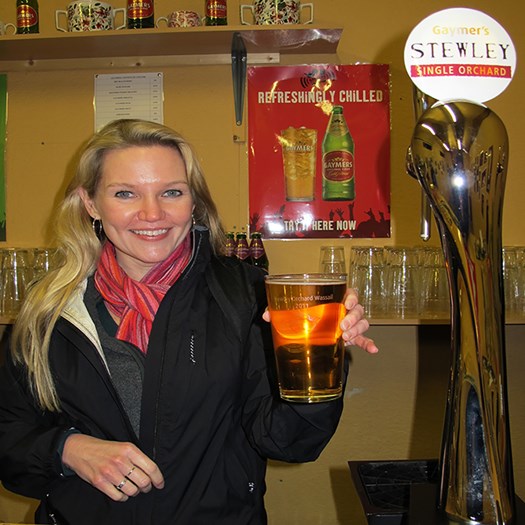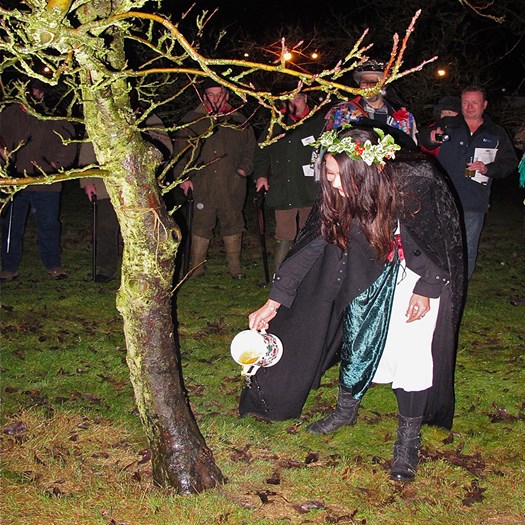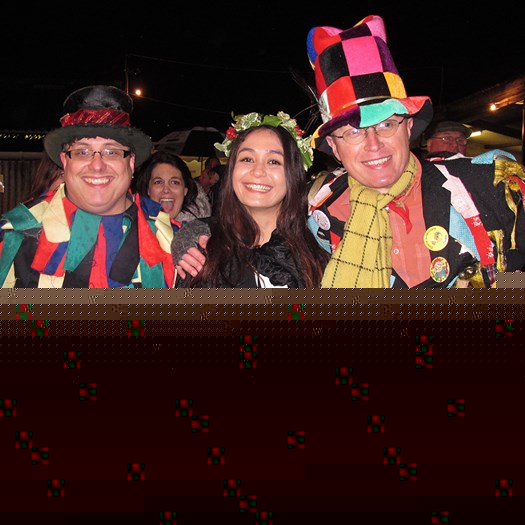SOMERSET, ENGLAND - Inebriation, ammunition, a blazing bonfire, and a beauty queen. Throw in a healthy dose of pagan mysticism — and barrels-full of cider — and you, my friend, have got the recipe for one rockin’ wassail, as I discovered on a visit to this delightful West Country hamlet one wintry January night.
So what, you might well ask, is a wassail, other than a health and safety inspector’s knee-knocking nightmare, combining alcohol, flames and firearms? It can refer to a form of Christmas carolling, but in the West Country — counties such as Devon, Dorset, Somerset, Gloucestershire and Herefordshire — a wassail usually denotes a lively fête held in an orchard on Twelfth Night, which can be interpreted as either January 5 or, for those who prefer the old Julian calendar, January 17. The ritual dates back to at least the 1800s, but its roots (ahem) are likely much deeper. The term “wassail” means “good health” and may have originated as early as 1,000 years ago.
Eager to experience this uniquely English ritual for myself, I headed to Illminster on a bleak and rain-lashed evening, where a crowd of more than 200 revellers had gathered in a sodden apple orchard. The jaw-dropping Christmas debts had come due, the days were damp, cold and dark, and it was ages until the next holiday weekend. We should, by rights, have been crying in our pints.
But despite the dismal winter gloom and the unrelenting downpour, the mood was downright jovial in Stewley Orchard, where Magner’s Shepton Mallet Cider Mill was holding an invitation-only wassail. Anorak-clad guests basked by a bonfire that burned bright as Beelzebub’s hearth or huddled within leaky-roofed farm buildings that had been converted into a canteen, concert hall and standing-room only pub, where the orchard manager dispensed several varieties of free-flowing Gaymer’s cider.
Gradually, a buzz began to build as a band of English folk dancers known as Morris men (and women, in this case), gathered among the cheering revellers. Tarted up in rainbow-coloured rags and top hats, they engaged in a series of carefully choreographed advances and retreats, hooting and clicking sticks whenever they were within striking distance.
Perhaps inspired (or alarmed) by their derring-do, Bob Cork, Shepton Mallet Cider Mill’s general manager, stepped out into the rain in his wool coat and wellies to deliver a short safety speech, warning all in attendance not to poke their eyes out with low-lying branches as we headed into the grove. Never mind that he would shortly be heading up a firing squad — but more on that later. And with this announcement, the wassail had officially begun.
“It’s designed to drive the evil spirits from the orchard and encourage good spirits to bring lovely blossoms and fruit,” according to Adrian Somerfield, a jovial, white-bearded fellow, Somerset born and bred, who served as the evening’s master of ceremonies.
The wooing of the woodland spirits is primarily the job of the wassail Queen. On this particular year, Karen Jensen, production administrator at the cider mill, was nominated for the role by her colleagues. The dusky beauty admitted that she’s not particularly superstitious.
“I don’t walk under ladders, but that’s more common sense,” she said, adjusting the floral garland that crowned her long brown tresses. “But it’s nice to be involved with the old West Country traditions. It’s a bit of a privilege,” she acknowledged — although, naturally, the honour required a strict training regimen.
“I’ve been drinking lots of cider in preparation,” she grinned.
Yet the wobbling horde had no trouble hoisting her slight, velvet cloak-clad frame upon their shoulders, transporting Jensen a short distance to the orchard, where she deposited cider-soaked toast into the branches of a tree to attract robins, which are thought to embody benign spirits. She then tipped a mug of cider at the base of its trunk.



Above: Our writer Amy gets into the spirit of the event while some locals show off their unusual attire.
“That’s putting some goodness back in the ground,” noted Bob Chaplin, fruit and orchard manager.
After Jensen’s tender display, the next step was — rather horrifyingly — to shoot the unsuspecting tree, albeit with blanks. This, as the master of ceremonies explained, was to evict the evil spirits (squatters rights and sleeping neighbours’ eardrums be damned) and make way for the good spirits to swoop in.
Then, as the smoke cleared, the increasingly jolly crowd concluded their courtship by serenading the leafy object of their affections:“Old apple tree we wassail thee, and hoping thou will bear hatfuls, capfuls, three bushel bagfuls — and a little heap under the stairs!”
The rain was falling harder, but it hardly dampened our spirits. For several hours more, we kicked up the hay-strewn dance floor as the Wassail Blues Band, attired in dark suits, sunglasses and de rigueur fedoras, regaled us with hip-swivelling tunes like “Mustang Sally” and “In the Midnight Hour.”
Surveying the weaving crowd, Bob Cork looked on with an expression of amused benevolence.
“Wassailing could be considered an organic way to get rid of pests, as we couldn’t find anyone who produces a spray to get rid of evil spirits,” he quipped. “But most importantly, it’s about having a good time and enjoying ourselves.”
If the success of that wassail was in any way proportionate to the next morning’s hangover, I reckon it produced a most abundant harvest.
About the Author
As a UK-based writer and photographer (and self-confessed natural coward attempting to conquer her fears through her travel adventures), Amy Laughinghouse has paraglided 007-style in the Swiss Alps, walked with lions in Mauritius, swum with sharks in French Polynesia, dangled from chains on Scotland's Fife Coastal Path, and--her most terrifying challenge ever--taken ballroom dance lessons in London. In addition to her own website, AmyLaughinghouse.com, she has contributed to many travel publications, including LonelyPlanet.com, Qantas Airlines’ in-flight magazine and Virtuoso Life magazine.